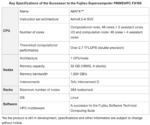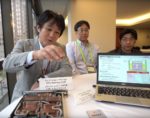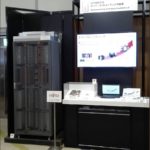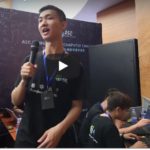Today Fujitsu announced that it has completed the design of Post-K supercomputer for deployment at RIKEN in Japan. While full-production of the full machine is not scheduled until 2021-2022, Fujitsu disclosed plans to productize the Post-K technologies and begin global sales in the second half of fiscal 2019. “Reaching the production milestone marks a significant achievement for Post-K and we are excited to see the potential for broader deployment of Arm-based Fujitsu technologies in support of HPC and AI applications.”
Arm A64fx and Post-K: A Game-Changing CPU & Supercomputer
Satoshi Matsuoka from RIKEN gave this talk at the HPC User Forum in Santa Fe. “Post-K is the flagship next generation national supercomputer being developed by Riken and Fujitsu in collaboration. Post-K will have hyperscale class resource in one exascale machine, with well more than 100,000 nodes of sever-class A64fx many-core Arm CPUs, realized through extensive co-design process involving the entire Japanese HPC community.”
Video: The Game Changing Post-K Supercomputer for HPC, Big Data, and Ai
Satoshi Matsuoka from RIKEN gave this talk at the Rice Oil & Gas Conference. “Rather than to focus on double precision flops that are of lesser utility, rather Post-K, especially its Arm64fx processor and the Tofu-D network is designed to sustain extreme bandwidth on realistic applications including those for oil and gas, such as seismic wave propagation, CFD, as well as structural codes, besting its rivals by several factors in measured performance. Post-K is slated to perform 100 times faster on some key applications c.f. its predecessor, the K-Computer, but also will likely to be the premier big data and AI/ML infrastructure.”
Video: Fujitsu Post-K Supercomputer to feature World’s Fastest Arm Processor
In this video, Nicolas Charbonnier from ArmDevices.net interviews Fujitsu engineers working on the Post-K supercomputer in Japan. Based on the Arm-based A64FX from Fujitsu, the Post-K supercomputer will likely be the fastest system in the world when in debuts in 2021. ‘Fujitsu A64FX is the new fastest Arm processor in the world, built on 7nm it has 2.7 TFLOPS performance per chip suitable for high-end HPC and AI, they aim to create with it the world’s fastest supercomputer with it by 2021.”
Fujitsu to Showcase Post-K Supercomputer CPU Prototype at ISC 2018
Today Fujitsu unveiled details about their ARM-powered Post K exascale supercomputer, which is planned for deployment at RIKEN in Japan sometime in 2021. Fujitsu has now completed the prototype CPU chip for the machine, which may be the fastest ever commencing functionality field trials. “The Post K processor will likely become the most powerful general-purpose CPU ever for HPC and AI,” said Satoshi Matsuoka from RIKEN on his blog this week.
Radio Free HPC Reviews the Results from the ASC 2018 Student Cluster Competition
In this podcast, the Radio Free HPC team reviews the results of the ASC 2018 Student Cluster Competition.
“The ASC 2018 Student Supercomputer Challenge finalist were announced on March 20, 2018. The 20 finalists will design and build supercomputers up to 3,000 Watts, solve exceptionally difficult problems in AI reading comprehension, perform RELION optimization as a core application of the Nobel winning cryo-electron microscopy, and utilize CFL3D, HPL, and HPCG.”
Post K Supercomputer Delayed in Japan
Nikkei in Japan writes that the Post K supercomputer is facing 1-2 year delay for deployment as part of the Flagship2020 project. Originally targeted for completion in 2020, the ARM-based Post K supercomputer has a performance target of being 100 times faster than the original K computer within a power envelope that will only be 3-4 times that of its predecessor. Nikkei cites semiconductor development issues as the reason for the project delay.
ARM to Power New RIKEN Supercomputer
ARM processors will provide the computational muscle behind one of the most powerful supercomputers in the world, replacing the current K computer at the RIKEN Advanced Institute for Computational Science (AICS) in Japan. During the ISC conference, Fujitsu released details of the new system during a presentation with Fujitsu vice president Toshiyuki Shimizu. Shimizu stated that the “post K” system, which is set to go live in 2020, will have 100 times more application performance than the K supercomputer.











